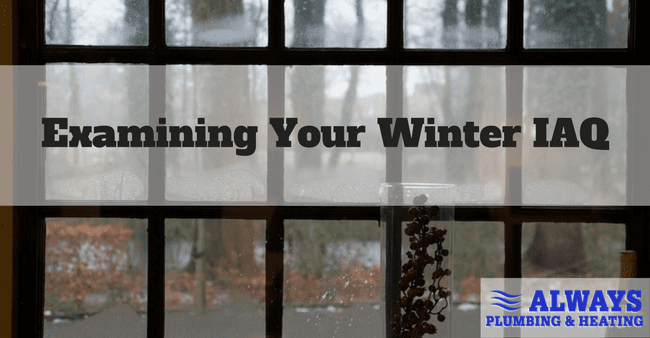Now that Edmonton is in the middle of another winter season, it’s time to look at the impact that it has on the indoor air quality (IAQ) of your home. With lows in the negative double digits and snow storms in constant rotation, homes are closed tight – and central air is on 24 hours a day. These two factors alone can negatively impact your IAQ, but in the winter there are several other issues that can also be detrimental to the air you breathe. These are especially important when you consider the effect on the health of your family. Always Plumbing & Heating has compiled a list of factors in the winter that can contribute to poor IAQ. As we move deeper into winter, be mindful of these areas and try to keep your air as clean as possible.
Indoor Pollutants
Similar to the summer, when the home is closed up tight with the air conditioning running constantly, your winter IAQ can become similarly stale. However, unlike the summer, which will often allow for a little ventilation by opening windows in the morning or evening – an Edmonton winter rarely gets warm enough for an open window. This means that the dust and dirt that build up from outside contamination on shoes and clothes has nowhere to go. If you have pets, they can also track in dirt and other pollutants as well as shedding hair and dander. Smoke from cigarettes or from a fire place can greatly contribute to the toxic buildup.
Tip: Consider turning on exhaust fans for a few minutes every day to help move out some of the impurities in the air. Also, plan a day when the temperature goes above freezing to ventilate your home. Open a couple of windows on either side of the house and place a box fan in a window (blowing outside). Even for a few minutes, this trick will help circulate the air and get rid of some of the pollutants. Dusting and vacuuming on a daily basis is also recommended in the winter.
Toxic Chemicals
Cleaning supplies, scented products, automotive products and art supplies that are stored in your home can contain an array of toxic chemicals. Phthalates (found in many fragrance products), Perchloroethylene (found in carpet and upholstery cleaners), Triclosan (soaps and detergents) and many more common chemicals can invade your IAQ. Most of these products are kept somewhere convenient inside the home including sink cabinets, pantries and closets. Even if the products are kept closed and hidden from view, they can still contaminate the home through small leaks and, of course, through usage. The negative effects are even more prominent when the winter air in the home is constantly being recycled.
Tip: Take an inventory of your chemical-infused supplies and do a little research. Collect the most toxic products and store them in your garage or storage area. Try to keep them in a space that is independent from your home’s central air system.
8 Hidden Toxins: What’s Lurking in Your Cleaning Products?
Environmental Pollutants
The outdoor air of your city also help to contribute to the IAQ of your home. Fortunately, the air quality health index of Edmonton is generally good (denoted as low risk), especially in the winter when allergens and ozone are generally insignificant factors. The frigid air outside can affect the IAQ though. Low humidity can actually wreak havoc on the health of your family, so it’s important to ensure your home has a fair amount of humidity in the air. The relative indoor humidity should be around 40 to 60 percent for a healthy home. If it is any higher or lower, both your home and household will suffer.
Tip: During the winter, consider investing in a humidifier to keep the humidity at a healthy level. It will help ensure that family with respiratory problems and skin sensitivity won’t suffer the adverse effects of dry air. It will also keep the wood in your home from warping and cracking.
Mold and Mildew Contamination
Mold, Mold Spores and Mildew are less likely to spread in your home during the winter months, but an infestation during this period can be extremely detrimental to your home. Be mindful of pipe problems during the winter as frozen plumbing can cause immediate leaks, which are the main reason for mold and mildew infestation. Leaks in your kitchen and bathroom (where high humidity is frequent) should be taken care of as soon as they appear. Standing water can cause quite a bit of damage in addition to the mold and mildew that it can create, so water issues should be tackled quickly.
Tip: Go through the house and search for traces of mold and mold triggers. The bathroom, kitchen sink area, basement and places where there is exposed ductwork should be checked on a regular basis.
Always Plumbing & Heating would like to remind you that changing out the HVAC filter regularly in the winter (at least once a month) will also help with your IAQ. If you need any assistance with keeping a healthy IAQ this winter, our technicians are trained in specific and targeted procedures that can benefit your entire air filtration and ventilation system. Call us at 780-489-8118 to schedule an appointment today!
Related Blogs:
The Importance of Indoor Air Quality

